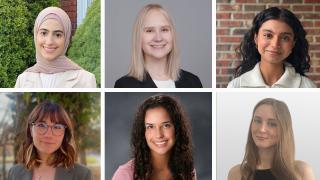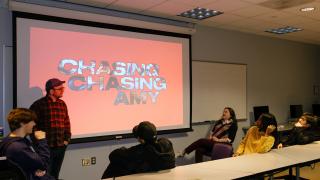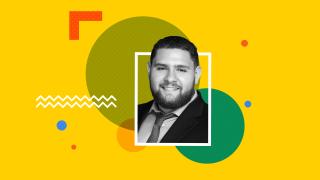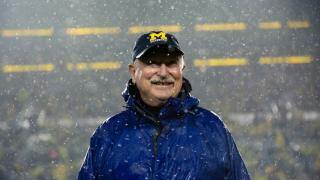
RELS/POL: 355 Religion and Politics was inspired by the 1980 Iranian Revolution and Stockton’s realization that, for much of the world, religion is a political paradigm.
“I tell students that this is not a class about religion, but a class about politics. It is about how we humans organize ourselves around religious ideologies and religious communities and enter the political system.”
The class does not have a textbook; instead, Stockton relies on primary source materials. On the Tuesday or Thursday meetings, lecture and student discussion is based on documents like Osama bin Laden's 1996 Declaration of War on the U.S. or President Abraham Lincoln’s Gettysburg Address.
“I think of this as a class in comparative politics. It allows me to bring together a whole range of topics that don't ordinarily go together: The Maccabees uprising from the Bible, how a pope is elected, Liberation theology, the Scots Irish, voting in America, the life of Mohammed and Islamic revolution,” Stockton said.
In addition to using primary texts, Stockton ties the material to cultural references and the latest news in his lectures. In a course last week, Stockton talked about the current civil war in Syria, tying in bin Ladin’s Declaration of War on the U.S. and the history of the Middle East.
Stockton, who crossed out every reference of God or religion in the text to better understand the political theory of the message, said bin Ladin wasn’t particularly a religious man, but he wanted to get rid of the Western-installed governments and restore order based on the teachings of the Quran in order to unite the region.
“He saw the turmoil as a result of what the West had done. Since the 1916 Sykes-Picto Agreement between the French and the British, four of the five countries in the Middle East have had civil unrest and war. It’s still happening today. Currently Syria is disemboweling itself,” he said. “I’m not saying any side is right or wrong. I’m just showing that it all ties together.”
As Stockton spoke about politics, faith and history, he didn’t use PowerPoint or YouTube. He just spoke, sharing stories, and occasionally using chalk to write out a name or place with a complicated spelling. And his room full of students was engaged for the entire 75 minutes. Even when he ran a little over, no one started packing up.
Junior Bayan Jaber, whose name means declaration and her father chose it to honor the Communist Manifesto, said it’s one of her favorite courses. The international studies major said it’s important to learn about different perspectives to give an understanding of why people act the way they do. Jaber, who went to Catholic school, doesn’t have formal religious or political affiliations, but identifies as a Lebanese woman whose family practices Shia Islam.
“When there are things you don’t know or understand, there is ignorance and fear that comes along with it—even if you don’t want to admit it,” she said. “This class treats these religious leaders as political actors, which diffuses the tension, gets you to open your mind and helps you see why things have happened.”
Freshman Christian Ledford said he grew up in a nondenominational Christian household and when it comes to politics and religion, he’d call himself a conservative.
“I grew up being taught that the Bible is (contextually) literal. I’m learning new things here and even though politics and religion can be controversial topics, nothing Professor Stockton says is insulting or uncomfortable,” he said. “The ways he presents the information is in a historical text. He makes connections, everything is reasonable and does make sense, even when it’s the first time I’ve heard some of these things.”
Stockton said as long as the students are broadening their worldview, he feels like he’s done his job.
“I want students to come away saying, ‘I never thought of it that way,’” he said. “Today a student told me that he was learning critical thinking from this class. I have never been sure of what critical thinking is, but if he is beginning to see familiar things from a totally different way, then that is what I want.”




